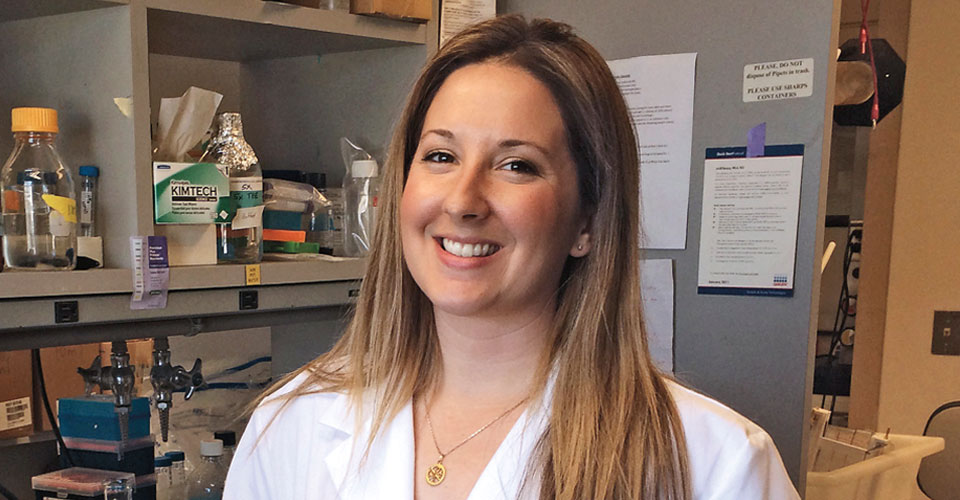Jennifer DuPont ’08 is investigating what triggers high blood pressure as we age

Jennifer DuPont ’08 in the lab at the Molecular Cardiology Research Institute at Tufts Medical Center in Boston, MA.
Photo courtesy of Jennifer DuPont.
Sixty-seven million Americans have it. Nearly a thousand people die from it each day. And in just one year, it can cost the nation more than $40 million.
Hypertension, or high blood pressure, takes a tremendous toll on our country, both in lives and in dollars. And as the population ages, these sobering statistics are expected to increase.
But what if that trend could be reversed?
This question is at the heart of Jennifer Dupont’s research. A postdoctoral research fellow in the Molecular Cardiology Research Institute (MCRI) at Tufts Medical Center in Boston, Massachusetts, Dupont is on a quest to discover the molecular factors in aging that contribute to hypertension. “Life is about helping people,” she says. “I happen to be interested in science, and I want to use that to help people.”
High blood pressure is the most common cardiovascular disease risk factor, and its prevalence greatly increases with age, affecting roughly 60 percent of people over the age of 60 and 80 percent of the population over the age of 80. “This is a huge public health issue because current therapies do not adequately control blood pressure in half of patients over the age of 50,” says DuPont, who has been part of MCRI’s international team of investigators, physician-scientists, trainees, and researchers since June 2013. “Our goal is to better understand how to control blood pressure as we age and identify innovative therapeutic drug combinations that will help reduce the morbidity and mortality rates related to aging-associated hypertension.”
DuPont earned her bachelor’s degree in exercise science and physiology from PSU in 2008. An excellent student and talented researcher, she received full scholarships at the University of Delaware, where she earned both her master’s and doctoral degrees in applied physiology. When she began her search for a postdoctoral research fellowship, she focused on Boston, which is home to some of the country’s top research hospitals and close to her family. Her fellowship at MCRI has given her the opportunity to expand her scientific skill set. “All of the research I did in graduate school was clinical-based, working directly with patients, so I had very little molecular biology experience,” she says. “This fellowship challenged me to step into a laboratory where I had to learn almost everything from scratch. It has been an extremely rewarding journey.”
Rewarding indeed: already her work has garnered awards and recognition both nationally and internationally. Last January, she was honored with an American Heart Association Postdoctoral Fellowship, a highly competitive grant that helps to fund her research. In April, she was one of only 10 junior researchers worldwide to earn the American Physiological Society’s (APS) Cardiovascular Section Research Recognition Award. She also earned the APS’s Caroline tum Suden Professional Opportunity Award, which recognizes promising postdocoral and medical residents.
DuPont is already thinking ahead to her work post-fellowship. “In the next year, I will be applying for several competitive awards that will aid in my transition from a fellow to an independent investigator,” she says. “Ultimately, my goals are to have my own laboratory where I can continue to study cardiovascular disease and also teach and mentor students. I’ve been fortunate to have had great teaching and mentorship throughout my journey as a scientist, and I believe that passing that on to future scientists, clinicians, therapists, and others is an extremely important aspect of my career and the path I have chosen.”
■ Barbra Alan
Tags: Barbra Alan cardiovascular disease exercise science and physiology health high blood pressure hypertension Jennifer DuPont research

















